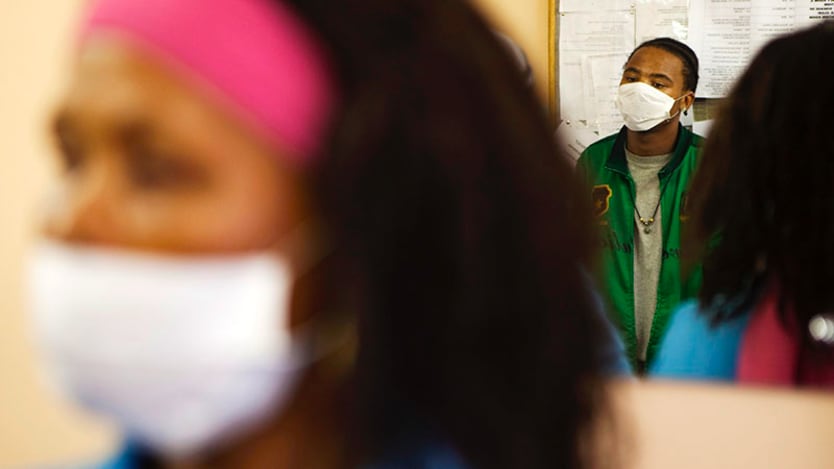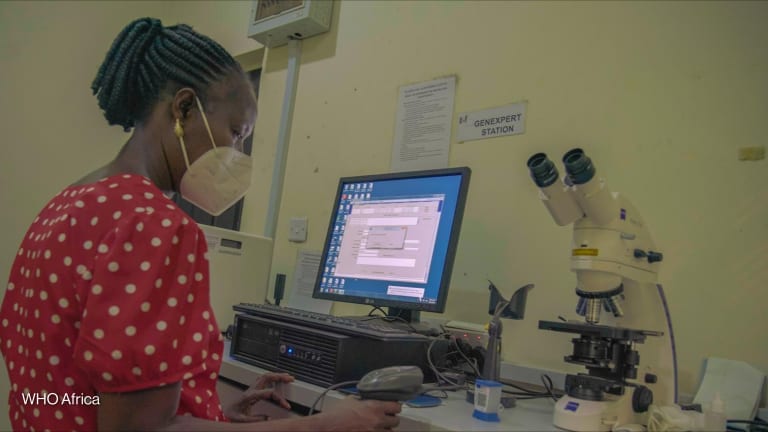
JOHANNESBURG, South Africa — Tuberculosis is one of South Africa’s biggest health challenges with 322,000 new cases diagnosed each year, about 3.4% of which have some form of drug-resistance.
The country has been able to innovate the way tools and medicines that work in the lab and in clinical trials are delivered to patients, said Yogan Pillay, South Africa’s deputy director-general for health. South Africa was among the first to roll out bedaquiline, a new medicine transforming TB care, and diagnostic tool Genexpert, which tests for the presence of TB as well as resistance to one of the main TB medicines, rifampicin.
“I’ll be the one celebrating in the streets if we get a needlestick test for TB like we have for HIV.”
— Yogan Pillay, South Africa’s deputy director-general for healthIn an interview with Devex, Pillay described the lessons that can be learned from its approaches to tackling TB and how they can be replicated in other problem areas such as noncommunicable diseases.
This conversation has been edited for length and clarity.
How is South Africa working to eliminate or reduce the huge health challenges — TB, HIV, and NCDs — it faces?
The first thing is to know what you’re dealing with. We need to understand the epidemiology, so how many people are affected, how many people are likely to get affected, where are they, how many males, how many women, and how many children.
What do you need to do to prevent people from contracting either HIV or TB? And then of course how do you find those infected early and put them on the best possible treatment at the lowest possible price? Where there's a cure, like with TB, how do you ensure people are cured the first time around? With HIV, how do you ensure that people stay on treatment and are virally suppressed?
The focus is, from the health sector side, getting the best diagnostics at the point of care, the best treatment for the lowest price, and ensuring that both of these get to patients where they are.
From the patient point of view, education is very important. Educating communities about how to prevent some of these diseases because they are preventable — TB is preventable, HIV is preventable, NCDs are for the most part preventable, 40% of cancers are preventable.
What are some of the innovative approaches South Africa is taking to tackle TB in particular?
We've done a fair bit to try and figure out how to find patients quickly and put them on treatment, but I think what we’re known for is innovation with respect to taking things that work in the laboratory — and have been shown in clinical trials to work — to the market so to speak and to patients.
For example, if you look at diagnostics, we were the first country in the world to take the Genexpert technology to every one of our 260 plus laboratories in the country, which means that we were able to find, not only drug-resistant TB, but also drug-susceptible TB more rapidly.
The second is with new drugs. Because we have large numbers [of patients], we are able to work with pharmaceutical companies to get new, innovative drugs into the country and into our facilities rather rapidly. We are continuing to work with pharmaceutical manufacturers, the TB Alliance, and others to see what new drugs are in the pipeline.
The key thing for TB, in particular, is to shorten the duration of treatment of both drug-sensitive and drug-resistant TB, and of course to get a point of care diagnosis for TB like we have for HIV. I’ll be the one celebrating in the streets if we get a needlestick test for TB like we have for HIV.
What would your advice be to other countries that also have a high burden of TB?
Will a new TB treatment be available soon?
A group of independent experts advising the U.S. FDA recently voted on a new drug to be part of a combination regimen for highly resistant tuberculosis. Will the regulatory body heed their advice?
The first thing is to be innovative, but do that in a way that protects the safety of patients because no one wants to be reckless at the expense of patients. Secondly, it's to take things as quickly as possible from research into the clinic at scale because that's what helps most patients most rapidly. The third of course is to do everything you can to reduce the prices of both diagnostics as well as the cost of medicines.
How do you go about working with pharmaceutical companies to bring down the price of drugs? Do you have any advice?
For some, we work with our local producers and suppliers, and for others, we work with agencies globally — World Trade Organization, WHO, Bill & Melinda Gates Foundation, Clinton Health Access Initiative, and UNITAID — to get them to look at global volumes.
If we take bedaquiline for example, we started the discussion with Johnson & Johnson locally and we worked with them to try and get a better price by leveraging the fact that we were going to use large volumes fairly early relative to the rest of the world. Manufacturers don't want small volumes because it doesn't pay for them to make small quantities of anything.
It’s a blessing in disguise because on the one hand we've got a huge burden, but on the other hand, we're able to use the huge burden to bring down global prices that benefit the whole world.
Are there lessons you can learn from the way you’ve innovated around the TB space that could be applied to other potential health challenges that the country faces?
Absolutely. We are now currently using it to bring down prices for cancer drugs. Cancer drugs are expensive and we have a growing burden of disease. We're using the same tactic even though our volumes are much smaller than TB and HIV.








